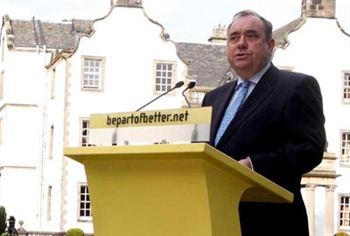
THE GREATEST speeches in Scotland’s history are to be showcased in a book.
The nation’s top orators are listed in the new publication, including former First Minister Donald Dewar for his powerful speech heralding the opening of the Scottish Parliament.
Alex Salmond’s speech after the SNP came to power in May 2007 is also documented in the book, called Great Scottish Speeches.
The memorable monologues of fictional characters are ranked alongside historical figures.
Irvine Welsh’s junkie Renton, famously played by Ewan McGregor in Trainspotting has an entry for bemoaning Scots as “the lowest of the f**king low”.
The book, to be published by Luath Press next week, contains 65 speeches by Scots – or made in Scotland – that range across some of the most enduring moments in the country’s 2000 years.
And the publishers want readers to vote online for their favourite pieces of oratory, with the results to be broadcast on St Andrew’s Day, November 30.
The author is political biographer David Torrance, whose criteria were that speeches had to be made in Scotland or by Scots elsewhere in the world and that each one had to be “great”.
Their greatness “primarily came down to content”.
A “truly great speech needs to say something” and “make an argument with coherence and brevity”, argues the author.
First-century Scottish chieftain Calgacus opens the book with his rallying cry to persuade 30,000 warriors to take on the all-conquering Roman army at the Battle of Mons Graupius in northern Scotland around AD83. “To robbery, slaughter, plunder, they give the lying name of empire; they make a solitude and call it peace,” he told his soldiers before, unfortunately, leading them to defeat against numerically-inferior but war-hardened Roman legions.
But it moves into more peaceful and politically-inspired times that encompass the Acts of Union, Scotland’s contribution to the British Empire, the emergence of socialism in Scotland’s industrial heartlands and the beginnings of Scottish Nationalism in the early 20th century.
Great social and economic issues are covered in the speeches of BBC founder Lord Reith, who opposed the introduction of commercial TV and Edinburgh-born politician Robert Boothby, who argued in 1954 that “homosexuality is far more prevalent in this country than is generally admitted”.
Union leader Jimmy Reid’s 1972 rectorial address to Glasgow University students on Communist philosophy and human nature – later described by the New York Times as “the greatest speech since President Lincoln’s Gettysburg Address” also earns its place.
But as well as politicians and social reformers, fictional literary characters also get a chance to shine.
Miss Jean Brodie’s mission statement – “I am a teacher! I am a teacher, first, last, always,” as written by Muriel Spark is there.
The cry from the heart by Renton – delivered to his junkie pals – was Welsh’s way in the early 1990s of describing the relationship that had built up between Scotland and England over the preceding centuries. He and his friends were living in a nation “colonised by w**kers”, he said.
The book included the prediction by veteran Labour parliamentarian Tam Dalyell who in 1977 said that “the devolutionary coach … will be on a motorway without exit roads to a separate Scottish state”.
Dewar’s speech came on 1 July, 1999, when the Scottish parliament ushered in a new political era. “Today there is new voice in the land, the voice of a democratic parliament,” he told the massed ranks of newly-elected MSPs and the rest of the nation.
The book ends with the current First Minister’s speech to Holyrood on 4 May, 2007, as he formed the first SNP government. “Scotland has changed – for good and forever,” he exclaimed, four years before his party was returned to Holyrood with a majority.
Salmond has penned a foreword in which he says: “As Scotland embarks on a new process of discussion and debate about our constitutional future, it is timely to celebrate the different voices and strands of opinion which have taken the nation to our present place – and to encourage new voices for our future progress. Let the discourse begin!”
Robin Jones, a spokesman for Luath, said: “The book is a marvellous collection of some of the great speeches over the course of Scottish history, but everyone will have their favourite. We hope that readers will take part and we can arrive at some sort of conclusion as to whose was the very best.”
Votes can be made by visiting the website www.greatscottishspeeches.co.uk

